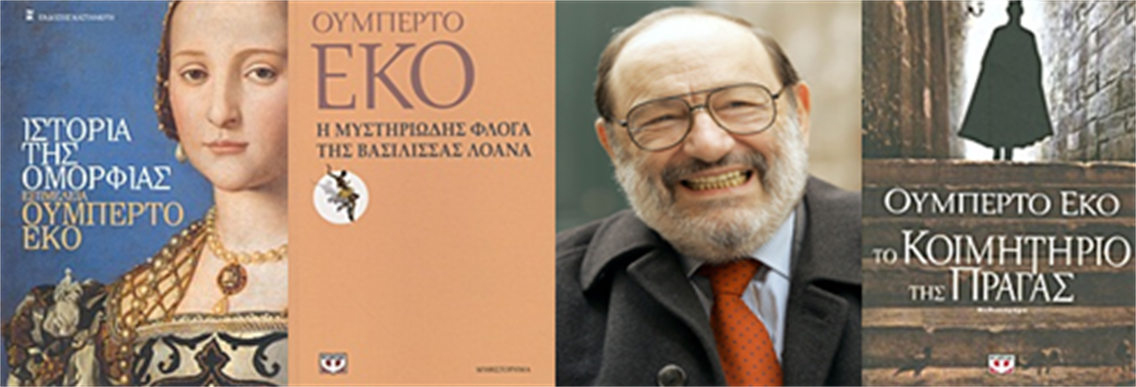
Umberto Eco (1932-2016)
Βiography
“Umberto Eco, essayist, philosopher, literary critic and novelist was born in in the city of Alessandria, in Piedmont in northern Italy, on January 5, 1932. His family name “Eco” is supposedly an acronym of “ex caelis oblatus,” meaning “divine gift” in Latin. Eco studied medieval philosophy and literature and earned his doctoral degree in philosophy in 1954, having completed his thesis on Thomas Aquinas. In 1988 he became Director of the International Center for Semiotic and Cognitive Studies at the University of San Marino. In 1965, he was elected Associate Professor of Visual Communication in Florence, whilst in 1966 Associate Professor of Semiotics in Milan. In 1971, the University of Bologna offered him the position of full Professor of Semiotics and in 1974 Eco organized the International Studies Association. Additionally, he co-founded Versus: Quaderni di studi semiotici (known as VS among Italian academics), a semiotic journal. During the 1970s, he began to write novels; the first one, “The Name of the Rose,” sold millions of copies worldwide and won both the Strega Prize (Italian literary award) in 1981 and the Medicis Etranger (French literary prize) in 1982. Eco, together with his wife and two children, divided his time between his home in Milan (an apartment-labyrinth containing a 30,000 volume library) and a vacation house in Rimini. He was fluent in five languages, amongst them Ancient Greek and Latin, which he often used in his both his academic and literary books. From the onset of his career, he had earned numerous honors and achieved dozens of publishing successes. Amongst his treatises are: “Opera aperta” (The Open Work), 1962; “La struttura assente” (The Absent Structure), 1968; “Tratato di semiotica generale” (A Theory of Semiotics), 1975; and “Lector in fabula,” 1979. He emerged as a novelist in 1980 with “The Name of the Rose,” which was followed in 1988 by “Foucault’s Pendulum.” Eco died on February 19, 2016 at the age of 84.”
– from Biblionet
Read more in Greek…
Βιβλία του συγγραφέα διαθέσιμα στη Βιβλιοθήκη
Η ομορφιά της λίστας. Αθήνα: Εκδόσεις Καστανιώτη, 2010. (ART 701.1709 ECO)
Ιστορία της ασχήμιας. Αθήνα: Εκδόσεις Καστανιώτη, 2007. (ART 111.85 ΙΣΤ)
Με το βήμα του κάβουρα: θερμοί πόλεμοι και λαϊκισμός των ΜΜΕ. Αθήνα: Ελληνικά Γράμματα, 2006. (854.914 ECO)
Αναμνήσεις επί χάρτου: κείμενα για τη βιβλιοφιλία. Αθήνα: Ελληνικά Γράμματα, 2006. (028 ECO)
Η δύναμη των λέξεων. Αθήνα: Ελληνικά Γράμματα, 2006. (808 ECO)
Η μυστηριώδης φλόγα της βασίλισσας Λοάνα: εικονογραφημένο μυθιστόρημα. Αθήνα: Ελληνικά Γράμματα, 2005. (M ECO)
Ιστορία της ομορφιάς. Αθήνα: Εκδόσεις Καστανιώτη, 2004. (ART 111.85 ECO)
On beauty. London: Secker and Warburg, 2004. (ART 111.85 ECO)
Περί λογοτεχνίας. Αθήνα: Ελληνικά Γράμματα, 2002. (809 ECO)
Μπαουντολίνο. Αθήνα: Ελληνικά Γράμματα, 2001. (M ECO)
Η αναζήτηση της τέλειας γλώσσας: στην ευρωπαϊκή παιδεία. Αθήνα: Ελληνικά Γράμματα, 1995. (401.3 ECO)
Το νησί της προηγούμενης ημέρας. Αθήνα: Γνώση, 1995. (M ECO)
Πώς γίνεται μια διπλωματική εργασία. Αθήνα: Νήσος, 1994. (808.02 ECO)
Πολιτιστικά κοιτάσματα: προτάσεις για τη διατήρηση και τη διαχείριση της πολιτιστικής κληρονομιάς. Θεσσαλονίκη: Παρατηρητής, 1992. (069 ECO)
Η σημειολογία στην καθημερινή ζωή. Αθήνα: Μαλλιάρης-Παιδεία, 1992. (302.2 ECO)
Πώς να διαψεύδετε μια διάψευση και άλλες οδηγίες χρήσεως. Αθήνα: Γνώση, [199-;] (854.914 ECO)
Foucault’s pendulum. New York, N.Y.: Ballantine, 1990. (PB F ECO)
Foucault’s pendulum. London: Picador, 1989. (F ECO)
Σημειώματα. Θεσσαλονίκη: Εκδοτικός Οργανισμός Θεσσαλονίκης, 1990. (854.914 ECO)
Το εκκρεμές του Φουκώ. Αθήνα: Γνώση, 1989. (M ECO)
Η αποκάλυψη του Ιωάννη. Θεσσαλονίκη: Εκδοτικός Οργανισμός Θεσσαλονίκης, 1989. (228.07 ECO)
Θεωρία σημειωτικής. Αθήνα: Γνώση, 1988. (302.22 ECO)
Το όνομα του ρόδου. Αθήνα: Γνώση, 1985. (M ECO)
The name of the rose. London: Picador, 1984. (PB F ECO)
Ενδιαφέρουσες ιστοσελίδες
http://webtv.ert.gr/category/katigories/politismos/keraies-tis-epoxis-mas/ (Ο Eco στην εκπομπή της ΕΡΤ Οι κεραίες της εποχής μας)
http://www.theparisreview.org/interviews/5856/the-art-of-fiction-no-197-umberto-eco (συνέντευξη και παρουσίαση του Eco στο Paris Review)
http://www.theguardian.com/books/2016/feb/27/my-hero-umberto-eco-jonthan-coe (άρθρο του Jonathan Coe για τον Umberto Eco)
http://www.nytimes.com/2016/02/20/arts/international/umberto-eco-italian-semiotician-and-best-selling-author-dies-at-84.html?_r=0 (άρθρο / παρουσίαση του Eco στο The New York Times)
http://www.theguardian.com/books/2016/feb/23/umberto-eco-funeral-sforza-castle-milan (άρθρο της εφημερίδας Guardian για την κηδεία του Umberto Eco)
http://www.umbertoeco.com/en/ (ιστοσελίδα αφιερωμένη στον Eco και το έργο του)
http://epohi.gr/ena-gramma-toupouberto-eco-ston-eggono-tou/ (Το γράμμα του Eco στον εγγονό του)
http://www.tanea.gr/news/nsin/article/5336672/o-syggrafeas-poy-anagennhse-ton-mesaiwna/ (Άρθρο για τον Eco στην εφημερίδα Τα Νέα)
http://www.lifo.gr/articles/mikropragmata/90628 (Αποφθέγματα του Eco μαζί με πολλές φωτογραφίες του συγγραφέα)
http://www.cnn.gr/style/politismos/story/22395/oymperto-eko-1932-2016-apofthegmata-kai-apospasmata-mias-paixnidiarikis-lampris-sofias (Ο Eco περί βλακείας,αθλητισμού κ.ά.)

